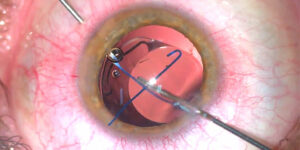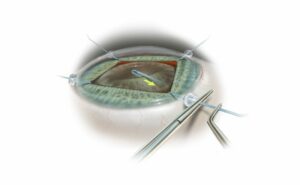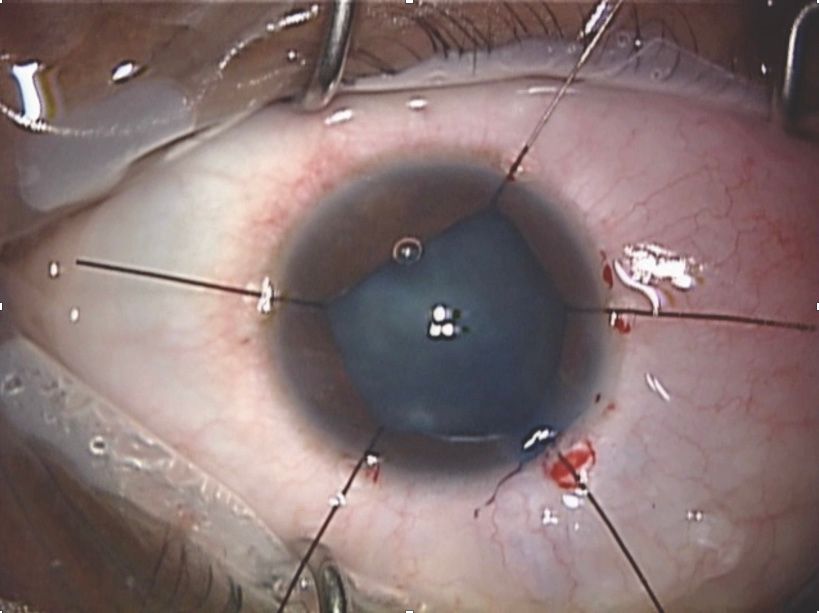Cataract surgery is one of the most common surgeries performed in the whole world. Million people have the procedure each year, and that number is expected to grow as the population ages. One such type of surgery is called an iris hooks cataract surgery, which can cause permanent damage to vision and may require additional surgery to repair. In this blog post, we will explore what an iris hook is, how it occurs, and what you can do if you or a loved one has experienced this type of complication.
What is IRIS Hooks Cataract Surgery?

Iris hooks are a type of surgical instrument used during cataract surgery. During this procedure, the surgeon makes an incision in the eye and then inserts a small device called an intraocular lens (IOL) into the eye.
The IOL is held in place by a series of tiny stitches or by an iris-fixated lens (IFF). An IFF is a special type of IOL that has two tiny loops or “hooks” that attach to the iris (the colored part of the eye).
Iris hooks are just one type of surgical instrument that can be used during cataract surgery. Other types of instruments include forceps, knives, and scissors.
How Does IRIS Hooks Cataract Surgery Work?
The working of IRIS hooks cataract surgery is that it helps in the prevention of posterior capsular opacification. This happens by creating tiny incisions (2-3mm) in the iris, which results in the formation of hooks. These hooks then help in holding the iris during the cataract surgery, thereby preventing its movement.
During the procedure of cataract surgery, the natural lens of the eye is removed and replaced with an intraocular lens. This intraocular lens helps in restoring vision. However, in some cases, the iris tends to move during the surgery, which can result in posterior capsular opacification.
Posterior capsular opacification is a condition in which the back part of the natural lens starts to grow again and becomes cloudy. This can lead to decreased vision. IRIS hooks help in preventing this condition by holding the iris in place during the surgery.
Sometimes, the surgeon may also place a suture in the iris to further secure it. This suture is usually removed a few weeks after the surgery.
Who is a Good Candidate For IRIS Hooks Cataract Surgery?

Choosing the best type of intraocular lens (IOL) for your cataract surgery depends on several factors. These include the health of your eye, your lifestyle, and your visual goals.
The IRIS Hooks technique is most suitable for patients with small pupils who are at a high risk of developing posterior capsular opacification (PCO). This is also known as a “secondary cataract”. This is when the back of the natural lens becomes cloudy, causing blurred vision.
IRIS Hooks can also be used in patients who have had previous refractive surgery, such as LASIK or PRK. This is because the hooks help to stabilize the IOL in place and prevent it from moving around inside the eye.
There are some of the factors of people choosing IRIS Hooks Cataract surgery:
Age
One of the biggest factors that will determine your eligibility for cataract surgery is your age. In most cases, doctors will only recommend the surgery when vision loss starts to impact your quality of life.
This means that if you’re young and your vision is only mildly affected by cataracts, surgery may not be recommended. Surgery is usually only considered when cataracts start to significantly interfere with your ability to perform daily tasks. These are such as driving, reading, or watching television.
However, there are some exceptions to this rule. For example, if you have a family history of early-onset cataracts, you may be advised to have surgery. This is even if your vision is only mildly affected.
Medical History
Your medical history can also affect your eligibility for cataract surgery. This is because certain medical conditions can increase your risk of complications after surgery.
For example, people with diabetes are more likely to develop an infection after surgery. They may also be at a higher risk of developing retinal detachment, which is a serious complication that can cause permanent vision loss.
People with autoimmune diseases, such as rheumatoid arthritis or lupus, may also be at a higher risk of complications. This is because these conditions can affect the healing process and increase the risk of inflammation.
Eye Health
The health of your eye will also be taken into consideration when deciding whether or not to recommend surgery. This is because certain eye conditions can make surgery more complicated and increase the risk of complications.
For example, people with glaucoma or macular degeneration may be advised not to have surgery because these conditions can make it more difficult to insert the IOL. People with these conditions may also be at a higher risk of developing vision problems after surgery.
Lifestyle
Your lifestyle can also affect your eligibility for cataract surgery. This is because people who participate in activities that put them at a high risk of eye injury, such as contact sports, may be advised not to have surgery.
This is because there’s a risk that the IOL could be dislodged if you experience a direct blow to the eye. People who work in hazardous environments, such as construction workers or miners, may also be advised not to have surgery because of the increased risk of injury.
What Are The Risks of IRIS Hooks Cataract Surgery?
There are several risks associated with IRIS hooks cataract surgery, including:
• Infection: Infection is always a risk with any type of surgery, and it is possible to develop an infection after undergoing this procedure. If you develop an infection, it may be necessary to take antibiotics or have further surgery to treat the issue.
• Bleeding: It is also possible to experience bleeding during or after this type of surgery. If you experience excessive bleeding, you may need a blood transfusion or additional surgery to stop the bleeding.
• Swelling: Swelling is common after any type of surgery and may cause your vision to be blurry for a short period. However, if the swelling does not resolve within a few weeks, you may require additional treatment.
• Detachments: retinal detachments can occur as a result of this surgery and can lead to permanent vision loss if not treated immediately.
How To Prepare For IRIS Hooks Cataract Surgery?

If you have been diagnosed with cataracts, your doctor may recommend surgery to remove the cloudy lens and replace it with a clear artificial one. This type of surgery is called cataract surgery.
Most people who have cataract surgery experience little or no discomfort and can return to their normal activities within a day or two. However, like any surgery, there are some risks involved.
To help ensure a successful outcome, it is important to follow your doctor’s instructions on how to prepare for cataract surgery. This may include:
Stopping certain medications: If you take blood thinners or steroids, your doctor will instruct you on when to stop taking these medications before surgery.
Avoiding alcohol: It is important to avoid drinking alcohol for at least 24 hours before surgery as it can increase bleeding during the procedure.
Eating a healthy diet: Eating a healthy diet helps promote healing after surgery. Your doctor may recommend that you eat foods rich in vitamins A and C as well as protein in the days leading up to your procedure.
Getting plenty of rest: Getting plenty of rest helps your body heal and recover from surgery more quickly. Be sure to get at least eight hours of sleep on the nights leading up to your operation.
Recovery Process Following IRIS Hooks Cataract Surgery
The recovery process following IRIS hooks cataract surgery is relatively short and straightforward. Most patients can return home the same day as their procedure and experience only minor discomfort. It is important to follow your surgeon’s instructions for post-operative care, which may include :
Using Eye-drops
One of the most important things you can do to help your eye heal properly is to use the eye drops prescribed by your doctor. It is important to apply the drops as often as your doctor tells you and not to skip any doses.
You will most likely be given a combination of anti-inflammatory and antibiotic drops, which should be used for 10 days following surgery. These will help reduce swelling and prevent infection.
If you have any questions about which eye drops you should use or how often, please ask your surgeon.
Wearing an Eye Shield
To protect your eye while it is healing, your doctor may recommend that you wear an eye shield at night during the first few weeks after surgery. You should also avoid rubbing or touching your eye during this time.
Doing Eye Exercises (Optional)
In some cases, depending on the type of cataract surgery performed with IRIS hooks, your surgeon may recommend that you perform some simple eye exercises once or twice per day for one week following surgery. These exercises involve holding a finger in front of your face and moving it from side to side, up and down, in circles and figure eights. The purpose of these exercises is to help strengthen the eye muscles. It is also to improve your vision.
Recovery Time Following IRIS Hooks Cataract Surgery
Most patients who undergo IRIS hooks cataract surgery can return to their normal activities within a day or two. It is important to avoid rubbing or touching the eye while it is healing. However, you should also avoid activities that could put unnecessary strain on the eye during this time. These are such as lifting heavy objects.
Conclusion
IRIS hooks are a type of surgical tool used in cataract surgery. They help to stabilize the lens during surgery and can be made from a variety of materials, including titanium and stainless steel. IRIS hooks are safe and effective and have been used in thousands of surgeries with no reports of serious complications. If you are undergoing cataract surgery, your surgeon may use IRIS hooks as part of your procedure.
Cataract surgery is a safe and painless procedure. At EyeMantra we have a team of experienced eye surgeons, who will be happy to answer any questions on cataract surgery, cataract surgery cost, cataract lens cost for different cataract surgery types- Phacoemulsification, MICS & Femto Laser Cataract. Call us at +91-9711116605 or email at [email protected] for inquiries. We provide effective cataract surgery in Delhi. EyeMantra Foundation also provides free cataract surgery for needy people.


